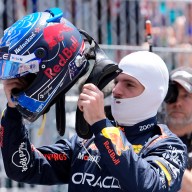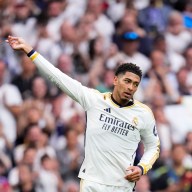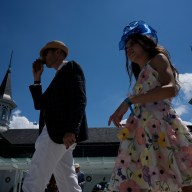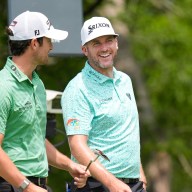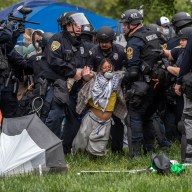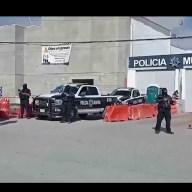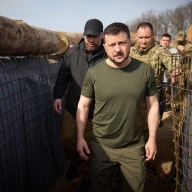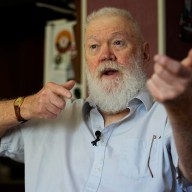 Kurt Angle and TNA wrestling with be in Boston June 2.
Kurt Angle and TNA wrestling with be in Boston June 2.
TNA Impact wrestling has been in existence since 2002 when grappler Jeff Jarrett and his father Jerry founded the company just over a year after WWE’s main competitor, WCW, went out of business.
Since that time, TNA has grown steadily and even got to a point where it challenged WWE’s flagship show, RAW, on Monday nights. Though TNA failed to make much of a dent in WWE’s monster Monday TV numbers and the experiment was ultimately short-lived, there was no question that a second major player in the pro wrestling world could not only survive but thrive in today’s ultra-competitive TV landscape.
The company is now moving away from its southern roots and beginning to tour the northeast on a regular basis and its version of WrestleMania is coming to Boston this summer.
Slammiversary XI will take place at Boston University’s Agganis Arena on Sunday, June 2 and tickets go on-sale Friday, March 29.
Metro had the chance to speak with one of the longest tenured members of TNA wrestling, Joseph Park, on a variety of topics including the upcoming PPV in Boston, TNA taking on the northeast corridor and whether or not we could ever see a wrestling boom like we last saw in the late 1990s.
Burke: Have you wrestled in Boston before and what type of wrestling town do you believe Boston to be?
Park: We did our “Lockdown” pay-per-view in Lowell five years ago and I’ve wrestled in Boston several times. It’s such a great wrestling market, second to none really, and has such a strong history of wrestling.
Burke: Why was TNA so reluctant to come to the northeast in the past?
Park: I don’t think there was any reluctancy, really. I think we had to find the right time to do it. We weren’t as prepared as we are now (to tour the northeast). In actuality a large part, a large majority of our fan base is in the northeast. Over the years we’ve really seen that that’s where our fanbase is.
Burke: How much of an advantage is it for you and other wrestlers while working in-ring and on the mic in front of crowds like you’ll see at Agganis Arena, true arenas, as opposed to a studio crowd like the ones TNA used to work in front of in Orlando?
Park: It makes a world of difference. Not just to me, but to our audience. When you walk out there with several thousand screaming fans the energy comes through the TV. When you’re watching it on TV it’s so much more fluid when there’s a live, invested audience. That excitement comes through and in our business, perception is everything.
Burke: Do you think TNA will ever be able to compete head-to-head with WWE?
Park: The biggest thing for us is to stay the course. There are a lot of people working so hard behind the scenes at TNA and we have a great team effort here. So we just have to stay the course. I don’t feel like we are competiting with (WWE), we’re competing with ourselves. We’ve had all that growth from the early 2000s to today and I’ve been around for all of it. We didn’t have house shows back then. No merchandise. We weren’t wrestling in places like the Agganis Arena in Boston. We just need to keep on this course and work as hard as we’ve ever done.
Burke: Who has been your favorite talent to work with in the business?
Park: Man, that’s tough. There’s so many. I’d say Kurt Angle, the only true Olympic gold medalist in the history of our business. AJ Styles, Samoa Joe, Sting, Hulk Hogan. There are so many guys. There’s just so much talent here.
Burke: In the past, just one great storyline can change the course of wrestling, like with what happened with the nWo angle back in the day. Do you guys think you’re just one big angle away from making a real splash?
Park: I don’t think it’s just one interesting storyline that can change things. The wrestling industry has changed so much since the nWo years. You can’t pigeon-hole yourself like that and think you’re one storyline away. I think that’s a mistake. It’s just gotta be several intriguing and interesting things to make it work. There’s so many TV channels out there. We’ve got to give you a little bit of everything.
Burke: I know that there was a change in direction as far as the writing team goes somewhat recently. Can you talk about the differences between a Vince Russo and a Dave Lagana?
Park: Everything’s been for the better, even though I thought Vince Russo did just a great job when he was here. The writing is phenomenal here. Just a lot of talented people. Dave Lagana and Matt Conway have really helped me and everyone has been great. Bruce Pritchard is head of creative now and Eric Bischoff is the executive producer. It’s just a great team we have here.
Burke: Do you think we could ever see a wrestling boom again like we saw in the late 1990s?
Park: I’ll never say never. That period in the history of the business was unprecedented but I truly believe in my heart that wrestling will always be there. What’s so unique about wrestling is that you can get as creative as you want.
Burke: Final question. Are you Abyss?
Park: I get that question a lot. We share the same mom and the same chromosomes. But I’m just an attorney that wears a tie.
Follow Metro Boston sports editor and columnist Matt Burke on Twitter @BurkeMetroBOS

